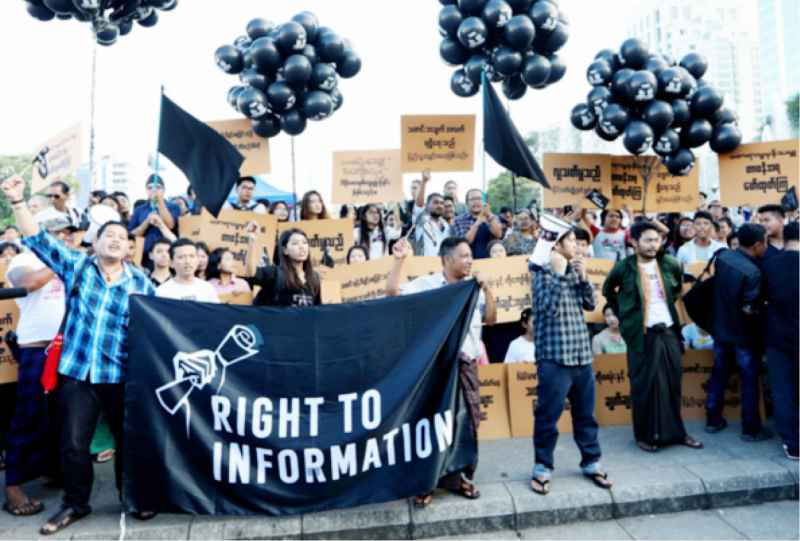Myanmar: Three years of dashed hopes
IPI members and other leading journalists on the perils of doing journalism under Aung San Suu Kyi 2015 marked what many thought would mark a monumental shift in Myanmar’s political landscape. The citizens of a country ruled for decades by the military headed for the polls in November in the first democratic election in decades. […]

Myanmar Three years of dashed hopes
IPI members and other leading journalists on the perils of doing journalism under Aung San Suu Kyi
2015 marked what many thought would mark a monumental shift in Myanmar’s political landscape. The citizens of a country ruled for decades by the military headed for the polls in November in the first democratic election in decades. The media were nervously expecting long-overdue freedoms and rights, including being able to report critically without the risk of repercussion.
There had been other positive signs: The International Press Institute (IPI) hosted its 2015 World Congress in Myanmar in March, in a sign of support for the country’s hoped-for embrace of press freedom. During the Congress’s opening ceremony, then-Information Minister U Ye Htut called the country’s reform process “irreversible.”
“There is no turning back” he said, even telling the audience to applaud a protester who interrupted his speech by calling on the government to “stop beating, arresting, imprisoning journalists.”
And, indeed, it seemed that the elections would yield promise. Nobel Peace Prize laureate Aung San Suu Kyi and her National League for Democracy won with a strong democratic mandate. Though still forced to share power with the military, Aung San Suu Kyi was appointed “state counsellor”, seen as the de facto head of government.
However, the initial optimism has been short lived, IPI members and other leading journalists in the country say.
“We hoped [Aung San Suu Kyi’s] government [would] fully understand the role of the media and maintain her stand on media like before. We even thought that there will be no ministry of information under her government”, Thu Rein Hlaing, editor of the Voice Weekly and an IPI member, said.
“But these things haven’t happened. And I am not sure they will ever happen in her term.”
Everyday life for journalists
Indeed, since assuming office, Aung San Suu Kyi’s government has disappointed – to say the least – those in and outside Myanmar who believed she represented change. Most prominently, under her watch two Reuters journalists, Wa Lone and Kyaw Soe Oo, were sentenced to seven years in prison for violating the Official Secrets Act of 1932, which dates back to British colonial rule. Wa Lone and Kyaw Soe Oo have been in custody since December 12, 2017.
The incident has rocked perceptions of Aung San Suu Kyi and contributed to what Myanmar journalists say is an atmosphere of fear.
“We have to self-censor all the time – we can’t comment about our government”, Brang Mai, CEO and editor of Myitkyina News Journal told IPI. “If we say something that could give them a bad image, we would certainly get fined.”
Self-censorship and fear were not what journalists had hoped for when the National League for Democracy took office.
But the challenges also extend to more mundane, everyday aspects of journalistic work. Journalists say they face difficulties obtaining even simple statements from the government.
“We can get small amounts of information which cannot impact them – small things that they don’t care about”, Brang Mai explained. “But the major decision making and all other governmental affairs and policy-making systems are inaccessible for journalists.”
Worryingly, the government maintains several legal tools in its arsenal to muzzle independent reporting. Article 66D of the infamous 2013 Telecommunications Law provides for up to three years behind bars for “extorting, coercing, restraining wrongfully, defaming, disturbing, causing undue influence or threatening any person using a telecommunications network”. The provision has been used to pressure both individuals, usually for posting on Facebook, as well as news outlets publishing reports online that are critical of the government.
Journalists worry about what the challenges mean for the survival of quality, independent news in the country.
“The media industry in Myanmar is going down and struggling to survive, resulting in the production of poor quality media”, Thu Rein Hlaing said.
Light at the end of the tunnel?
For Brang Mai, the immediate future looks bleak.
“I think within the next 2 or 3 years things will not change”, he said. “All we can hope for is international pressure: by ourselves, it’s really not possible. The whole governmental structure is corrupted.”
In that sense, the role of the international community in highlighting violations of press freedom in Myanmar and urging the government to allow the press to work freely becomes even more important.
“Aung San Suu Kyi must make good on the hope she once inspired in the media community”, IPI Deputy Director Scott Griffen said. “The government must free all journalists who are behind bars for simply doing their job. Access to information for journalists must be respected and strengthened. Antiquated laws like the much-misused 1932 Official Secrets Act must be repealed and other laws used to repress freedom of expression must be reformed to respect media freedom.”
Until the change that once seemed possible back in 2015 becomes reality, life for journalists in this corner of Southeast Asia is not expected to get easier. Myanmar’s journalists remain determined, but the pressure is clearly growing.
“Now we feel hopeless and helpless”, Thu Rein Hlang said. “But we have to continue our work for our readers. But we don’t know how long we can survive.” (IPI)
